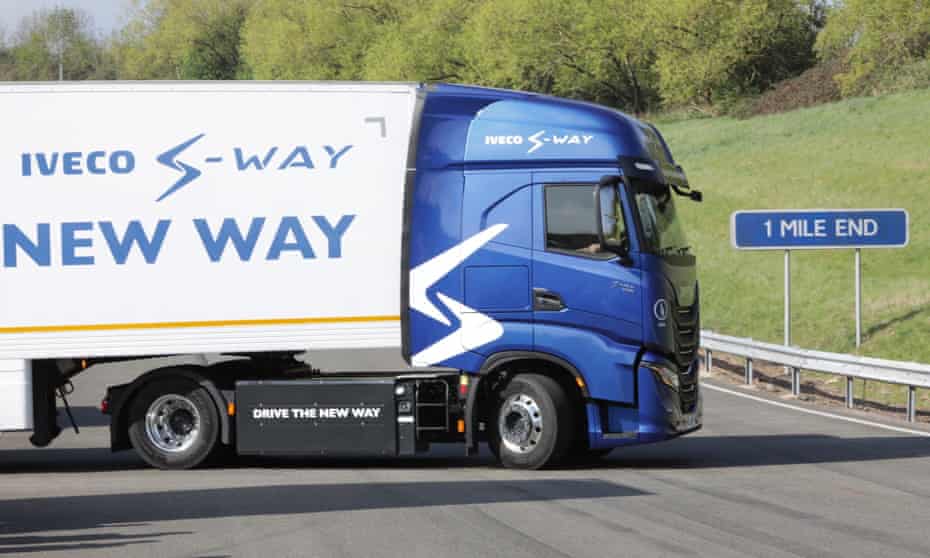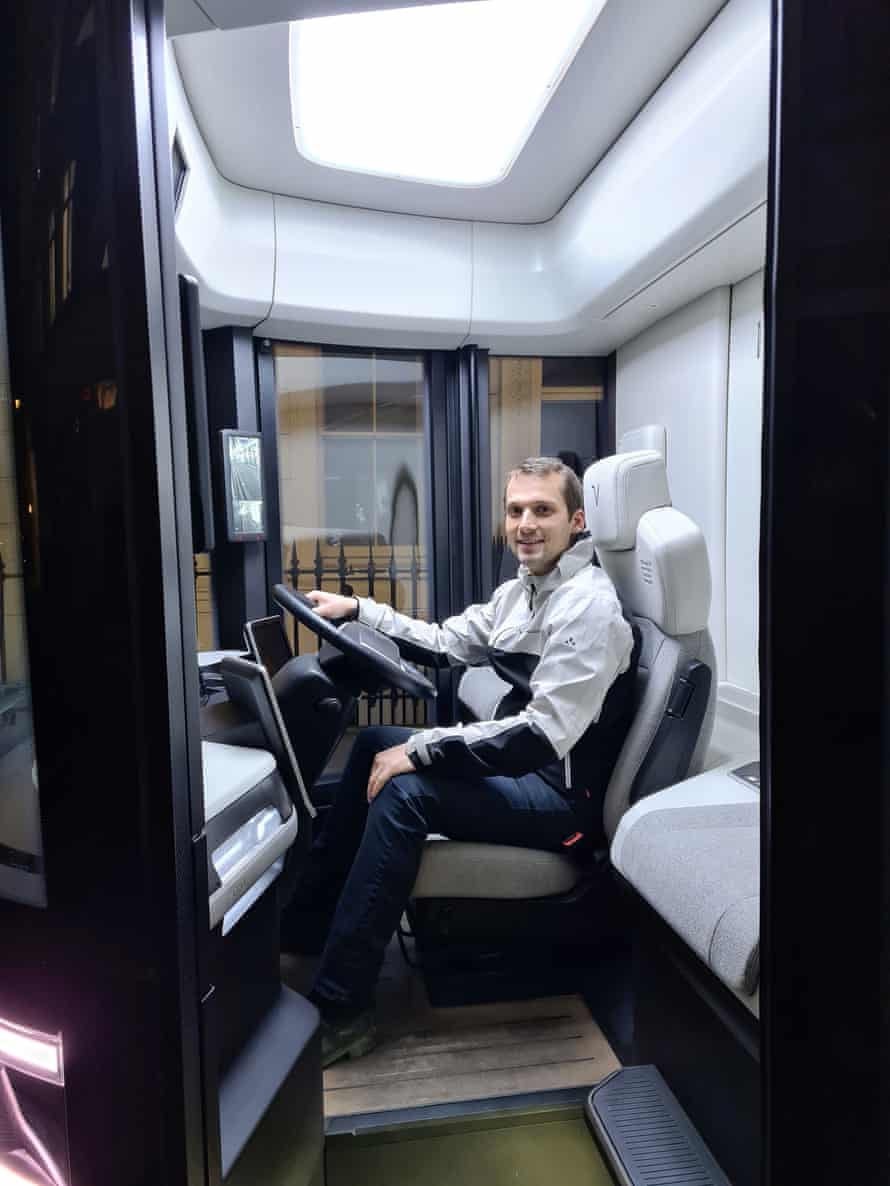‘This really is the future’: HGV manufacturers race to decarbonise trucks
Lorry vehicle makers are backing a range of technologies from gas to battery electric to cut UK’s carbon footprint on the roads

“Just be careful where your back end is going,” says the instructor as this reporter nervously steers a 44-tonne articulated Volvo lorry on a roundabout. It is good advice at roundabouts, as in life. The trailer rolls past the safety barrier with a barely visible gap, to the relief of everyone involved.
It is a manoeuvre played out across the world countless times each day as lorries lug the goods required for modern life from factory to consumer. However, this truck is slightly different: instead of a diesel engine, it is running on natural gas.
It is one of the products of a series of bets by lorry manufacturers on how to reduce the carbon footprint of road transport, a key contributor to global carbon emissions. About 16% of the UK’s carbon emissions in 2019 were from heavy goods vehicles, which carried 1.4bn tonnes across 17.8bn km in the year to June 2021, according to the Department for Transport.
Manufacturers are backing a range of technologies from gas, to battery electric and various types of hydrogento try to decarbonise those journeys – but none has yet succeeded at scale.

Everyone who drives an electric car for the first time after a lifetime of petrol or diesel has had the moment of realisation: this really is the future. A similar dynamic is happening now with lorries. At the same test drive event, held this week at the Millbrook Proving Ground by the Society of Motor Manufacturers and Traders, there was also the chance to try out the LF Electric, assembled by Dutch lorrymaker DAF Trucks at its Leyland subsidiary in Lancashire.
Compared with the noise and judder of a diesel engine it is a serene experience on a sunny spring day in the rolling Bedfordshire hills. So serene, in fact, that another good-natured instructor has to intervene to prevent another roundabout mishap.
The problems are range and cost. The LF Electric, of which 25 have been built so far, has a 220km range and smaller 19-tonne capacity that prevents it from taking on the motorway trucking routes that serve as the backbone of modern economies. And the sticker price is currently three times that of a diesel.
Even Elon Musk has been unable to crack the problem, judging by the Tesla Semi which is now years overdue. Nikola this week began production of electric “semis” at its new Arizona plant, but only after its founder, Trevor Milton, was charged with allegedly rolling a prototype down a hill to pretend it was working. Some experts think it will be 2025 before larger electric trucks hit the mainstream.
David Cebon, a professor of mechanical engineering at Cambridge University, has just completed the first stage of a government-funded feasibility study into a novel solution to batteries’ lower-energy density. An electric road system, or e-highway, would install train-style overhead charging cables on main roads.
Topping up a smaller battery through catenary cables on the road would save on the cost of buying more battery capacity for every lorry, and it would be more energy efficient and less damaging to roads because there would be less weight on the move. However, it would need full government buy-in to give permission and investment estimated at (a relatively modest) £19bn to cover most of the UK’s freight.
There is lower-hanging fruit in mid-duty trucking. Startup Volta Trucks is developing its products in Warwick in the UK, with the aim of building as many as 5,000 7.5-tonne and 12-tonne all-electric lorries in 2023, and a target of 14,000 the year after. The factory in Austria formerly made diesel vans.
Another startup, Tevva, is planning to make 9,000 7.5-tonne battery and hydrogen fuel cell trucks by 2025, in part at a site in Tilbury, Essex.
Volta will start a trial with the crown estate in the summer to supply central London shops from out-of-town warehouses. Essa Al-Saleh, Volta’s chief executive, told the Guardian: “That’s an ideal case for electrification where you only need to deploy charging infrastructure at the depot, or at the warehouse.”
The demonstrator seen by the Guardian just off London’s Regent Street earlier this year looks very different to traditional trucks, with the driver sitting at eye level with pedestrians and cyclists – potentially improving safety.
Al-Saleh thinks batteries will dominate, albeit with niches for other powertrains.
“I do think there are a lot of innovations that are extending the ranges and density of batteries, enabling longer distances,” he said.
The natural gas option is, of course, still a fossil fuel, so its combustion has a significant carbon footprint, and Russia’s war on Ukraine has added to the impetus to shift away from reliance on it in the long term. A cleaner alternative is methane produced by anaerobic digestion of food waste, known as biogas or bio-LNG (liquefied natural gas). Gasrec, a company working on gas refuelling stations for the likes of Tesco, Sainsbury’s and Asda, estimates that a truck running on bio-LNG reduces carbon dioxide emissions by 90% compared to a diesel.
Even Sweden’s Volvo and Iveco, an Italian-listed manufacturer whose S-Way is also available in natural gas version, are open about the fact that methane combustion is a transition technology.
Lars Stenqvist, head of trucks technology at Volvo Group, said: “It’s clear to us that we need more than one solution to decarbonise transport. We currently see three technologies in parallel that will decarbonise the heavy vehicle industry. We are investing more than ever into combustion engines, battery electric vehicles and fuel cell electric vehicles.”
One of the big unanswered questions in trucking is hydrogen’s role. Hydrogen is energy dense and offers very quick refuelling. Fuel cells can power electric motors with water as the only exhaust emission.
Brendan Bilton, chief technology officer of Element 2 (a reference to hydrogen’s place in the periodic table), is building a hydrogen refuelling network in the UK. He argued hydrogen would be needed for the biggest lorries doing long-haul routes without time to recharge.
“We haven’t heard anyone saying, ‘we’re just waiting for our 44-tonne truck to get a battery,’” he said. “It just doesn’t work.”
However, there are big questions over the amount of electricity needed to make green, high-purity hydrogen to power a large proportion of the world’s lorries. For this reason some analysts believe hydrogen fuel cells – or another option, combustion – will play a relatively small role.
“The potential future market for hydrogen vehicles is shrinking daily,” said Gniewomir Flis, who scouts electrochemical technologies at Energy Revolution Ventures, an early-stage investor. “I believe the majority of trucks will be battery electric.”